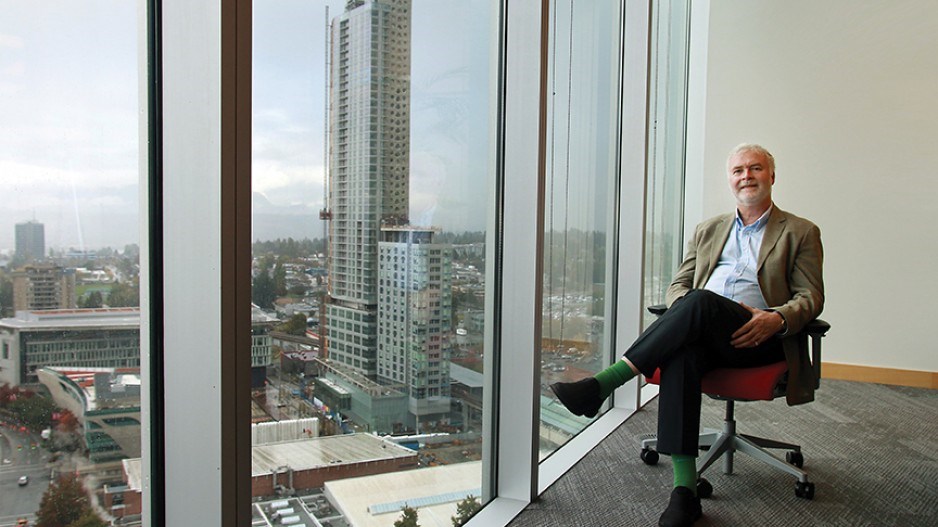The City of Vancouver has long walked a thin line between aiding and attracting real estate development to the city while trying to please a public hurt by shrinking affordability. The City of Surrey, on the other hand, has embraced an aggressive pro-business strategy as it plows ahead with a building spree in hopes of attracting people, jobs and companies to the area.
Back in the mid-2000s, Surrey mayor Dianne Watts was looking to garner interest in the city’s real estate development sector. The answer was the formation in 2007 of Surrey City Development Corp. (SCDC), a profit-making real estate corporation that answered to an independent board but with the City of Surrey as its sole shareholder. The move was part of Watts’ larger Build Surrey program, an ambitious plan to turn Surrey from a Lower Mainland afterthought to a destination for commercial and residential real estate investment and architecturally significant infrastructure projects. The move paid off: Surrey now has Central City and its Simon Fraser University campus, a new city hall in its downtown core and 3 Civic Plaza, a 52-storey mixed-use tower with luxury hotel rooms with residential move-ins slated for early 2018. The building will be the third tallest in the Lower Mainland. Michael Heeney, SCDC’s new president and CEO – he replaces outgoing head Norman Laube – said the corporation’s structure allows him to stay at arm’s length from government oversight while still taking the city’s development needs into account.
“The city has two appointees on the board, but the majority of the board are independent directors,” he said. “They are the ones that I report to, and they are expecting me to run it like a business.”
The SCDC’s board includes four independent directors from the private sector and two city directors who hold local government positions. One of the independent directors is Suki Sekhon, president and CEO of CRS Group of Companies, which owns a number of retail shopping centres, office and warehouse buildings in the Lower Mainland and Calgary and on Vancouver Island.
Heeney said 3 Civic Plaza is a good example of how the SCDC can have a light but forceful touch in development projects.
“If that was left up to the private sector I don’t think that a hotel would have gone in there, but a hotel is really needed to move city centre forward. With us being involved in that we were able to sweeten the pot enough that made sense for the partnership between the SCDC and Century Plaza.”
Last year marked the fifth consecutive year the SCDC paid a $4.5 million dividend to the City of Surrey as a result of its investments and projects, according to its most recent annual report.
The SCDC’s portfolio has a number of projects completed or under construction, including Campbell Heights North and East, which looks to turn the South Surrey enclave into an industrial powerhouse in the middle of a swath of residential developments. There are three designated “income properties” in which the SCDC played the role of real estate developer: Cedar Hills Shopping Centre, Bridgeview Industrial and Boundary Park Plaza. The last two have since been sold to private investors.
A number of big and small Canadian municipalities have similar development corporations operating within their jurisdictions. Squamish has the Squamish Oceanfront Development Corp. and the City of Calgary has the Calgary Municipal Land Corp., which was also launched in 2007 and was partially used to revitalize some of the city’s more downtrodden areas.
The idea of cities getting involved in private real estate development projects has its share of detractors. During the last municipal election in 2014, Surrey mayoral candidates Doug McCallum and Barinder Rasode vowed to dismantle the SCDC. Both said during campaign interviews with Business in Vancouver that the SCDC gave the city an “unfair” advantage with real estate development projects, and that the corporation favours certain players over others. McCallum went so far as to call it a “parasite,” though at that time the SCDC was not financially viable.
Linda Hepner, who was hand-picked by Watts to be her successor, ended up winning the race handily.
Brent Toderian, an urban planning consultant and former chief planner for the City of Vancouver, said it’s important for communities not to throw out the idea of development corporations simply because of “ideological objections.”
“Cities should be open-minded to the model,” Toderian said. “I don’t think you should take the route lightly, but in places where it makes sense it can be a very effective tool.”
Anne McMullin, president and CEO of the Vancouver-based Urban Development Institute, said in an email statement that the institute “supports public-sector participation in the development industry through joint ventures where municipalities are partners rather than competitors to the private sector.”




